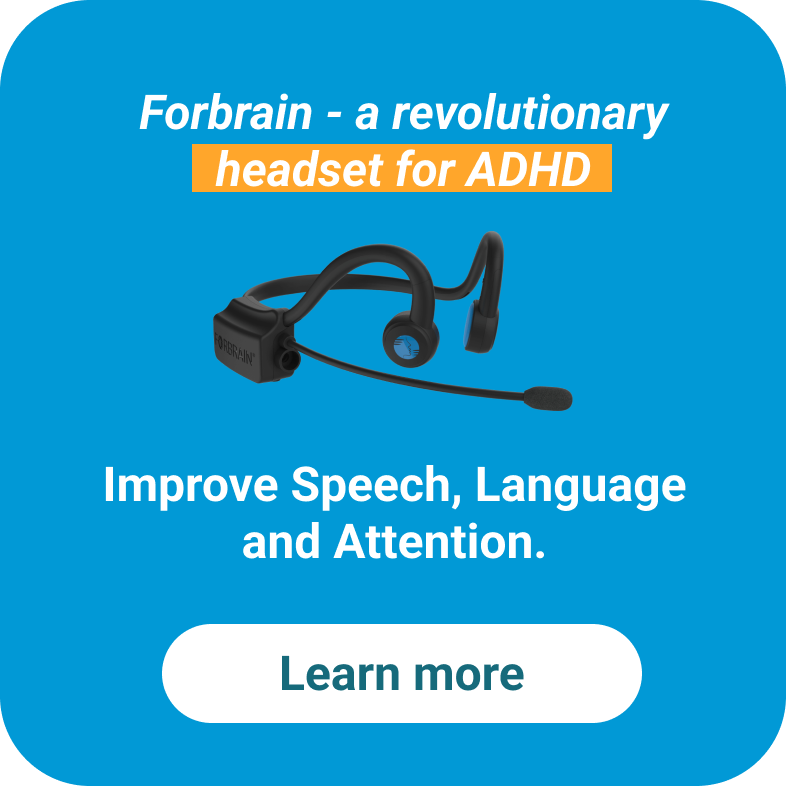How to Focus with ADHD: 12 Effective Tips and Strategies
 Natalie Fitzgerald
Natalie Fitzgerald Speech-Language Pathologist
September 11, 2023

Living with ADHD often presents a pervasive challenge: the struggle to maintain focus. Individuals with ADHD commonly encounter difficulties in concentrating on tasks, remaining attentive, and avoiding distractions. This challenge isn’t limited to a specific age group but affects both children and adults, making it essential to find effective strategies to enhance focus. If you are an adult with ADHD, or a parent of a child with ADHD, you may be wondering what helps ADHD focus. In this article, we aim to offer a comprehensive set of ADHD focus techniques to help both adults and children with ADHD improve focus and concentration.
How to Stay Focused with ADHD: Tips and Techniques
If you are wondering how to focus better with ADHD, some of the strategies included in this article may be helpful for you. Strategies play a pivotal role in improving focus and task completion. Some of our ADHD focusing tips include:
Create a Supportive Environment
For ADHD, the right environment can make a world of difference. Creating a supportive environment involves organizing the space to support focus by reducing clutter, organizing materials, and creating a comfortable workspace. It aims to minimize potential distractions by promoting an environment that is more conducive to improved concentration and task completion. By setting up an environment that is structured and organized, you can better channel your focus and be more productive.
Set Task Deadlines
Deadlines are helpful for most people, but if you have ADHD, setting deadlines can help you manage your time effectively by implementing structure and priority for your activities. Setting deadlines encourages a sense of accountability and helps prioritize tasks, which improves the ability to focus on completing objectives in a timely manner. An easy way to do this is to simply use the calendar on your phone and set reminders when deadlines are approaching.
Reduce Distractions
Distractions can have a huge effect on focus, but they can be detrimental if you have ADHD. Reducing distractions involves minimizing interruptions, background noise, or visual distractions (such as a cluttered work space) that might disrupt your focus. By creating an environment that limits potential disturbances, you can better concentrate on your tasks and enhance your ability to stay focused and engaged.
Use Notepads and Whiteboards
If you have ADHD, tools such as notepads, whiteboards, or calendars can support focus by visually organizing thoughts, ideas, and tasks. By writing down or visually organizing out tasks, you can effectively structure your work, aiding in improved focus and task completion. Utilizing notepads and whiteboards also helps individuals break down large tasks into smaller, more manageable steps to improve concentration.
Have a Separate, Organized Workspace
Having a dedicated area tailored for work aids in minimizing distractions which facilitates focus on work, assignments, or other tasks. This strategy involves arranging your workspace in a manner that promotes organization and efficiency, allowing you to concentrate better on your work. This could look like a separate room in your home, or it could be as simple as a desk with a curtain to block out external distractions.
Turn off the Phone
Turning off your phone can be a powerful tactic for individuals with ADHD aiming to improve focus and attention. By silencing or switching off phones, you reduce the temptation and interruption caused by notifications, calls, or social media. This intentional action minimizes the cognitive load and redirects attention to the task at hand, enhancing productivity and efficiency.
Use Timers
This strategy incorporates time management techniques like the Pomodoro method, aiding individuals with ADHD by breaking work into intervals with timed breaks. For the Pomodoro method, you work for 25 minutes and then break for 5 minutes. Additionally, using timers helps you to break tasks into manageable chunks, preventing mental fatigue and improving attention when it is time to work.
Relax When Needed
Everyone needs time to take a mental break. Relaxation permits you to take needed breaks, preventing mental exhaustion and allowing you to focus on tasks more effectively. This strategy encourages you to use relaxation techniques or brief breaks to increase your energy levels when it is time to resume work. By incorporating relaxation periods, you can enhance your overall attention span, resulting in improved task performance.
Have Positive Distractions
Positive distractions are brief mental breaks or relaxation activities that do not impede focus, giving you beneficial ways to divert your attention when needed. This strategy allows for occasional moments of distraction that refresh the mind without disrupting the overall focus on tasks. Examples of positive distractions could be taking a walk outside, completing a simple household task, or having a small snack. By incorporating positive distractions, you can alleviate mental strain and avoid burnout, which fosters a more balanced and sustained focus on your work.
Start with Harder Tasks
By addressing difficult tasks first, you can utilize your highest levels of mental alertness and concentration on the harder things, and save the easier tasks for when you have less mental energy. Further, completing the more difficult tasks first leads to a sense of accomplishment that makes it easier to keep going and finish the remaining work. This strategy leverages peak mental capacity, enabling individuals to dedicate their best efforts to the most challenging aspects of their work.
Don’t Blame Yourself
Self-compassion and understanding is very important when you have ADHD. It discourages self-blame and negative thoughts that can hinder your focus. This strategy encourages you to adopt a more forgiving and understanding attitude towards yourself. By avoiding self-criticism, you can maintain a clearer focus which allows for higher productivity and task completion.
Don’t Multitask
Multitasking is difficult for most people and very, very difficult when you have ADHD. It can disrupt focus and productivity and decrease the overall quality of work. This strategy emphasizes the significance of focusing on one task at a time to optimize your focus and attention. By concentrating on a single task, you can direct your mental resources more effectively, enhancing your ability to maintain attention and accomplish tasks efficiently.
ADHD Focus Difficulties
People with ADHD face a number of challenges related to focusing and often want to know how to improve focus with ADHD. It is important to understand these challenges so that strategies and other supports can be implemented to help improve or manage the symptoms you may experience as a person with ADHD. Focusing difficulties in ADHD are related to attention, regulation, and executive function skills. Some of the focusing difficulties commonly associated with ADHD include:
Executive Function
Executive function plays an important role in focusing with ADHD. Executive function includes abilities such as working memory, impulse control, organization and planning, and time management. These skills have a big impact on the ability to maintain attention and concentrate on tasks. Weakness in executive function can lead to challenges in regulating attention, making it difficult to sustain focus on a particular task or efficiently switch attention between different activities. Challenges in organization and planning can disrupt the ability to prioritize and complete tasks effectively. As a result, managing and enhancing executive function skills become crucial in improving focus and attention.
Inattentiveness
If you have ADHD, you probably struggle to sustain attention on tasks, particularly those that are repetitive or require extended mental effort. For example, you might find it challenging to stay focused during presentations, meetings, school assemblies, or when doing tasks that require sustained attention like school projects or writing papers. This can result in missing or incomplete work or misunderstanding.
Hyperactivity
Hyperactivity in ADHD is usually thought of as physical hyperactivity, such as a child who cannot sit still during class or mealtimes, constantly fidgets, or frequently switches between activities. However, hyperactivity in ADHD can also be mental, and is what most people would have previously referred to as ADD. Mental hyperactivity looks like racing thoughts or a persistent sense of mental business that makes it hard to focus.
Difficulty Following Directions
Because of the difficulties with attention, many people with ADHD have difficulty following directions. Particularly, there is a tendency to have difficulty following multi-step directions (directions with two or more steps such as “Before you go to lunch, put your paper on my desk.”). For example, you may forget parts of instructions to complete assignments, resulting in incomplete work.
Task Avoidance
Task avoidance is common with ADHD and can occur for a variety of reasons. You may have difficulty initiating tasks due to trouble organizing your thoughts and actions, impulsivity, or distractibility. Or, you may delay tasks and procrastinate because of mental hyperactivity and feelings of overwhelm.
Forgetfulness
Forgetfulness is very common with ADHD. You may commonly forget things like appointments, due dates, or important plans. Executive functioning challenges, like difficulties with organization, time management, and working memory, all factor into the tendency to forget information. Additionally, difficulties with organization and impulsivity can be related to forgetfulness in some situations, such as remembering where certain items (like your phone) may have been set down.
Distractibility
ADHD can be a big cause of distractibility. Simple things, such as background noises or messy environments, can draw your attention away from the task at hand. For instance, during a conversation, your might lose focus due to a sudden noise, making it difficult to maintain a conversation for an extended period. Or, you may become distracted by a messy kitchen when you are trying to make yourself lunch and forget to eat.
Impulsivity
Impulsivity is another characteristic of ADHD that affects focus. You might act without thinking, interrupt conversations, or impulsively shift from one task to another, disrupting your concentration and task completion. This impulsive behavior often leads people with ADHD to make spontaneous decisions that distract them from their primary task.
Hyperfocus
While it may seem counterintuitive, ADHD can also cause periods of intense focus on specific activities, referred to as hyperfocus. In periods of hyperfocus, you are able to concentrate intently, often to the exclusion of events in their environment. You may experience time-blindness (where there is an altered sense of how much time has passed), forget to do daily activities such as shower, eat, or use the restroom, or miss appointments. Hyperfocus may seem advantageous to some, but it poses its own set of challenges.
Using Forbrain to Help with Focus
Forbrain is an auditory feedback device that uses bone conduction to stimulate the brain’s system. By using bone conduction, Forbrain improves sensory processing, attention, and speech functions. By using Forbrain, individuals with ADHD may experience improved auditory processing and sensory awareness, which can lead to enhanced focus and attention. Using Forbrain can help people with ADHD better engage in tasks, participate in conversations, and manage stress-related challenges associated with ADHD symptoms. To learn more about how Forbrain can help manage ADHD symptoms, you can check out this resource.
Final Words
ADHD is a condition that affects executive function and causes numerous challenges related to focus and attention. People with ADHD experience difficulties such as inattentiveness, hyperactivity, impulsivity, and forgetfulness, which all affect the ability to focus on tasks. There are numerous strategies and techniques that can be used to improve focus in ADHD, including setting deadlines, reducing distractions, using timers, and taking breaks when needed.
Additionally, devices such as Forbrain can aid people in stress-management and sensory processing to improve attention. By incorporating the strategies mentioned in this article, you can help foster an environment conducive to improved focus and attention. Emphasizing these strategies within educational settings and at home ensures a more supportive and focused atmosphere for individuals with ADHD to thrive and successfully manage their attention-related challenges.
References
Advpsychiatry. (2023, September 20). ADHD tips for adults: Living with ADHD as an adult. Advanced Psychiatry Associates. Read more.
Brown, T. E. (2002). DSM-IV: ADHD and executive function impairments. Advanced studies in Medicine, 2(25), 910-914.
Swanson, J. M. (2003). Role of executive function in ADHD. Journal of Clinical Psychiatry, 64, 35-39.
The Royal Children’s hospital melbourne. The Royal Children’s Hospital Melbourne. (2020, August). Read more.





